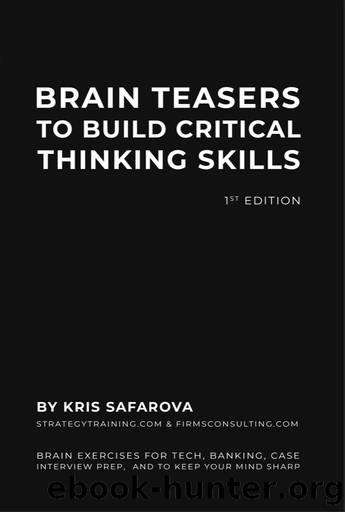Brain Teasers to Build Critical Thinking Skills by Safarova Kris

Author:Safarova, Kris
Language: eng
Format: epub
Publisher: FIRMSConsulting LLC
Published: 2022-10-24T00:00:00+00:00
QUESTION 66: I am the size of an elephant, but I weigh nothing. What am I?
ANSWER: An elephantâs shadow.
EXPLANATION: The way that the speaker is compared specifically to an elephant is the main clue that you need to pick up on in order to solve this teaser. There are very few things specifically the size of an elephant, and none of them are completely weightless. You could try to come up with something approximately the same sizeâa small cloud, perhaps, or a gigantic bundle of balloonsâbut approximation shouldnât be the goal when youâre working with brain teasers. Thereâs only one thing exactly the size of an elephant: that elephantâs own shadow at the right angle.
QUESTION 67: What is impossible to hold in your left hand, but easy to hold in your right hand?
ANSWER: Your left hand.
EXPLANATION: We automatically think of the two hemispheres of our body as equal which is why this brain teaser might seem baffling at first. How could something be impossible to hold in one hand but easy to hold in the other? If youâre right-handed, your mind might jump to something like a pencil, but that doesnât work; plenty of people are left-handed or ambidextrous, and âimpossibleâ is a stretch even for those who arenât. Trying to brainstorm objects of particular size or weight is also a dead end. The only thing your right hand can hold that your left hand cannot is your left handâitâs impossible for a hand to hold itself.
QUESTION 68: What do the words âjob,â âherb,â and âpolishâ have in common?
ANSWER: Theyâre pronounced differently when the first letter is capitalized.
EXPLANATION: This is an example of the importance of visualizationânot just when it comes to picturing scenarios but also words themselves. You should be able to evaluate a situation on all levels and make the necessary adjustments in order to detect patterns that may not be immediately apparent. In this case, if you experiment with capitalization, youâll find that these three words can also be proper nounsâand, when they are, theyâre pronounced differently. âJobâ and âPolishâ have long âOâ sounds, and the H in âHerbâ is no longer silent.
QUESTION 69: You have a bucket. Each day, the amount of water in the bucket doubles. It takes 20 days for the bucket to be full. How long does it take for it to be half full?
ANSWER: 19 days.
EXPLANATION: Exponential growth is a hard thing to wrap your head around; even when you feel like youâre familiar with it. For instance, think about this classic brain teaser: Would you rather start with one cent doubled every day for a month, or just take a flat rate of one million dollars? The answer is shockingly unintuitive, but true nonethelessâif you choose the former option, youâll end up with over five million dollars after 30 days. In the case of the bucket, you need to think a little bit backwards. If youâre doubling the amount of water every day, that means that day 20 contains double the amount of day 19.
Download
This site does not store any files on its server. We only index and link to content provided by other sites. Please contact the content providers to delete copyright contents if any and email us, we'll remove relevant links or contents immediately.
Deep learning with TensorFlow and Keras by Derrick mwiti(897)
Understanding PDA Autism in Kids: A Guide for Parents and Teachers to Support Neurodiverse Learners by Jehu Len(804)
The Victorian Era: A Captivating Guide to the Life of Queen Victoria and an Era in the History of the United Kingdom Known for Its Hierarchy-Based Social Order by Captivating History(601)
Writing Solid Code: Development Philosophies for Writing Bug-Free Programs by Steve Maguire(521)
100 Ideas for Secondary Teachers: Engaging Parents by Janet Goodall & Kathryn Weston(502)
Intersectionality in Educational Research by Dannielle Joy Davis; James L. Olive; Rachelle J. Brunn-Bevel; Susan R. Jones(498)
How to be assertive in any situation by Hadfield Sue & Hasson Gill(494)
Brain Teasers to Build Critical Thinking Skills: Brain Exercises for Tech, Banking, Case Interview Prep, and to Keep Your Mind Sharp by Kris Safarova(480)
Brain Teasers to Build Critical Thinking Skills by Safarova Kris(478)
Python 101 - Fundamentals by Sam(445)
Critical Curriculum Leadership : A Framework for Progressive Education by Rose M. Ylimaki(439)
The Art of Emotional Validation: Improve Your Communication Skills and Transform Your Relationships by Validating Emotions and Feelings by Emily Wright(405)
A Beginner's Guide to SSD Firmware by Unknown(394)
NumPy : From Basic to Advance by bisht Karan Singh(391)
The Knights Templar: An Enthralling History of the Rise and Fall of the Most Influential Catholic Military Order by Wellman Billy(387)
The Future Knowledge Compendium by Ellyard Peter;(386)
What Every Teacher Should Know about Learning, Memory, and the Brain by Tileston Donna E. Walker;(382)
Alma Maters (5th edition) by Unknown(377)
Make wealth from intraday trading by Maddy MADDY(366)
